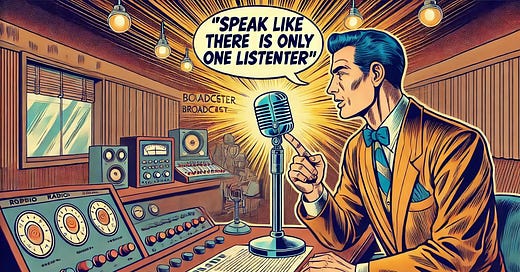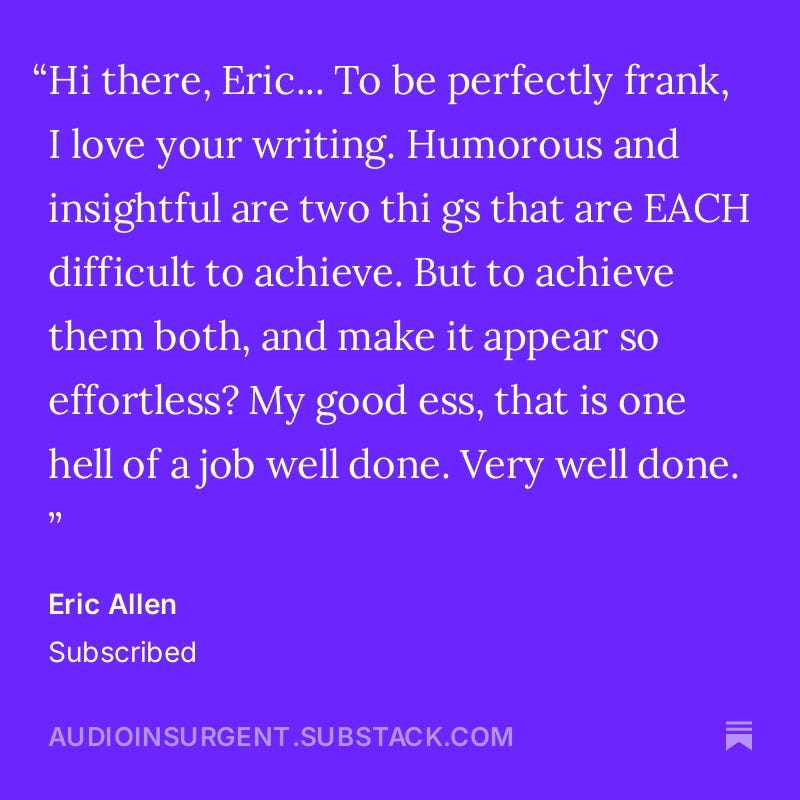The Power of Speaking to One Listener
Any time you open a mic, you are speaking to hundreds–or thousands–or hundreds of thousands of people. But you do best when you pretend there is an audience of one.
Welcome to Dispatch #71 of The Audio Insurgent.
The last dispatch was 4,116 words - about twice what I aim for. Plus, it is a holiday week. So here is a concept that’s easy to understand–and just as easy to implement–today!
And I want to say up front that if you are in the U.S., or live elsewhere but still celebrate Thanksgiving for some reason, I hope you have a wonderful and restful holiday. I will be sharing it with people I love, and get extra time with my dogs, so I will be right there with you. Please enjoy.
Okay so here goes…
[TODAY’S MAIN THING: THE POWER OF ONE] A lot of people criticize those who speak on Fox News as speaking to an audience of one–the former and soon-to-be President. But from a larger point of view, talking to an audience of one is among the best audience engagement hacks that you can do right away to deepen your relationship with the audience: speak like there is only one listener.
This is a piece of advice I give a lot of new hosts and talent. In fact, I’ve written it into three different sets of feedback notes this week alone.
Don’t talk to the audience–talk to one person.
Here are some examples of how this happens.
In an interview, the host will say, “Please tell the audience about the time that you…”
Or “I’m sure the listeners would love to know…”
Or “What I’ve heard from all of you in emails, DMs, and comments is that you all like to…”
Or “My audience isn’t interested in hearing spin…”
So, let’s start off by explaining why the above is bad.
Within my professional lifetime, I’ve seen a number of complete about-faces on how to address the audience and how to address yourself.
Early in my career in public radio, I was taught an unwritten yet widely-practiced rule that “I,” “we,” and “you” references should never be heard from a reporter or on-air announcer. “You” references to the audience were considered informal, inappropriately intimate, and somewhat presumptuous and rude. “We” references, sometimes referred to as the “Royal We” were considered exclusionary (to those outside the definition of the “we”). And “I” was forbidden because, frankly, “nobody cares about you.” Public radio voices were there to serve their subject, “inserting themselves into the story” (a phrase meant to sound as pejorative as it sounds) was pulling attention away from the subject. This was so widely and deeply held that NPR reporters were discouraged from even acknowledging their presence in a scene. I remember one international correspondent once told me that they were in a town square when an explosive device went off next to them. Their editor told them they could only say that a device exploded in the town square, not that it went off next to them.
I think a great deal of the stuffiness of public radio originates from, or is tied to, this ban on first and second person references.
Over time and with great resistance, these practices have slowly gone away.
But in the rest of the radio world, that practice didn’t really exist. If anything, the best commercial radio announcers and disk jockeys wrote the book on how to do this to create intimacy, rather than make it uncomfortable. As public radio evolved in its practices and struggled to let go of its deep formality, it was way behind the curve on how to effectively address the audience.
So as podcasting came along, many early podcasters emerged from the public radio ranks, or were total amateurs (as in non-professionals) who emulated a lot of what they heard in commercial talk radio, but frankly did it quite poorly. Between that awkwardness and lack of finesse grew the common practice of referring to the audience as a collective.
The reason this practice of addressing everyone should bother you is that it basically accomplishes nothing. It doesn’t build connections between the host, subject, and audience, it doesn’t project inclusion, and rarely is it true (Saying “I’m sure the audience would like to know…” is an assumption that implies that everyone is curious about the topic, which most likely isn’t true).
So, how do you fix it? That’s easy.
More after this jump…
Be like this reader who became a paid subscriber because they value what they read in The Audio Insurgent. It seems that everywhere you turn, someone is asking you to set-up a subscription. When that thing has value to you and you’d miss it if it went away, you gladly pay up. When I’ve asked subscribers why they decided to contribute to something they can get for free, the most common response is, “Because you asked.”
So here I am–asking YOU this time.
There are many very good places to hear today’s news about the podcasting and spoken-word industry. Here, I’m trying to do something different–create a space to understand several layers deeper, why things happen, and what the implications will be. This is a place for thought and analysis…plus my take on what it means.
If this is valuable to you, you can make sure it comes to you at least twice a month–and be among the first to read it–for as little as $5.
This reader did it. And so can you.
The answer involves training talent and staff to be vigilant of when these happen in scripting or recording, coming up with a flag, then backing up and fixing it. Every time. Change the collective reference to a singular one. Sometimes it is as easy as making plural references singular. Sometimes it is making general references specific. Sometimes it is best just to remove the reference entirely.
Instead of saying “My audience isn’t interested in hearing spin…”, say “You aren’t interested in hearing spin…”
Or instead of saying “I’m sure the listeners would love to know…”, say “I’m sure our listener would love to know…”
Or instead of saying “Please tell the audience about the time that you…” you could say “Please tell about the time that you…”
Or instead of saying “What I’ve heard from all of you in emails, DMs, and comments is that you all like to…”, try “What I’ve heard from you is that you like to…”
I’ve even heard some talent very effectively refer to the singular audience as “my friend” or by a insider-term like a “Murderista” or “Chairies.” It works.
Even in these off-the-cuff examples, you can see how the revised statements are more vivid, personal, direct–and effective. They build connection–and connection not only encourages them to come back, but makes the listener feel “in the club.” Those who feel a connection are your most loyal and ardent supporters. When you start asking for subscription support, these are the people who will respond. When you do a live event, these are the people who will come. When you put out merch, these are the folks who will buy it. The long-term effects of building the vibe of speaking only to them pays off in countless ways.
This may seem like a small thing, but it isn’t.
[LAST THING: IT’S AWARD AND LIST SEASON] I am very happy to see Esther Perel (and by extension Jesse) receive a Special Achievement Award for Where Should We Begin? They deserve it.
I have a deservedly bad reputation among my staff and contributors when it comes to awards and annual “best of” lists for being an absolute buzzkill when the subject comes up. So much so that my staff roll their eyes if someone mentions it, because they know what’s coming.
Let me find a constructive way to say this: I think that people should be recognized for excellent work. I think there is excellent work happening at all levels of the audio industry and I think that, especially in tough years, being recognized for that good work can be a thrill. However, I think the current state of media awards, especially around audio, couldn’t be further from that idea. Awards are a big business. Entries can cost hundreds of dollars each–which pretty much excludes most creators, especially those who might benefit from some needed exposure. “Winning” an award often requires things like a public PR campaign to garner votes or a required purchasing of tickets or tables at the award event, which, again, can be pricey. The whole thing just feels really gross, so we generally avoid participating.
The same thing is happening with “best of” lists at the end of the year. There is nothing wrong with sharing your work with those who write about podcasting, of course. But a lot of these lists now require a lot of gamesmanship and lobbying. Some of the writers are quite open that they expect you to grovel to get on their list and even offer advice on the best ways to do it. Again, quite gross, headed in a bad direction, and not worth it. Every year Mag Noise productions end up on some of these lists. And if you see one of our shows there, you know that the list is organically generated and is an honest reflection of what that writer enjoyed, as we don’t participate in lobbying for inclusion.
Rant over. Thank you for indulging me. ;)
Okay, that’s it for today.
Thousands of people read this newsletter without even a free subscription. If this was forwarded to you or you read this online, would you mind subscribing?
If you are a regular reader of The Audio Insurgent, I hope you’ll consider doing your part by supporting this work with a small donation. And if that’s too much, you are also always welcome to buy my book or (even better) buy me a beer.
Make great things. I’ll be listening.
--Eric





